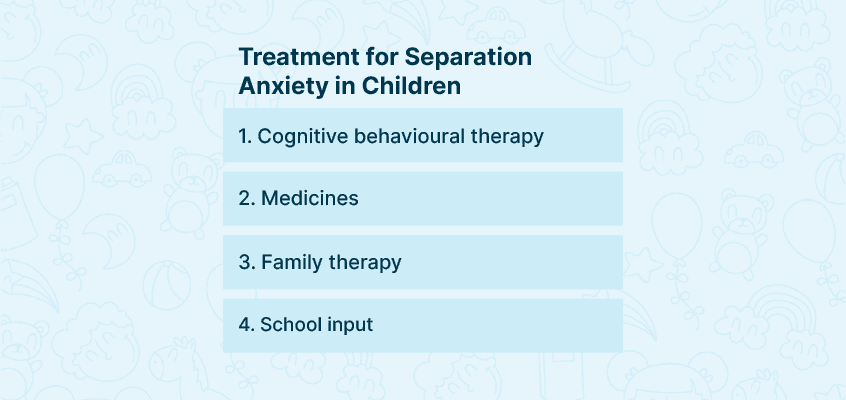Introduction
When parents say goodbye after dropping kids off at school, it’s natural for the kid to feel nervous. Crying, tantrums, and clinginess are characteristics of separation anxiety in early childhood, healthy reactions to separation and a typical component of the development period. It can start before a child’s first birthday and last until four years old. While separation anxiety in kids can vary significantly in strength and timing, it’s essential to remember that worries about leaving mom or daily even when they grow up.
However, some children endure separation anxiety that does not go away despite a parent’s best efforts. In some cases, separation anxiety is severe enough to interfere with daily activities such as school and friendships, and it lasts for months rather than days. It might indicate a more severe disease called separation anxiety disorder.
Our Wellness Programs
What Is Separation Anxiety?
Separation anxiety disorder is a significant mental disease marked by great anguish when a kid has been separated from the primary caregiver for a while. It is not a normal stage of development, and it first appears when the kid is seven months becoming stronger between 10-18 months; this becomes stronger and generally reduces when the kid becomes three years old. However, because separation anxiety and separation anxiety disorder have many of the same symptoms, determine whether the child needs time and understanding or has a more severe problem.

According to experts, environmental and biological factors can lead to separation anxiety in kids. Sometimes, chemicals present in the brain, namely serotonin and norepinephrine, cause this, or sometimes, the kids may inherit this problem. Any traumatic event or fearful family member can also make the kids develop separation anxiety.
Looking for services related to this subject? Get in touch with these experts today!!
Experts

Kirti Bajpai

India
Psychologist
Experience: 5 years

Neelam Parwani

India
Life Coach
Experience: 5 years

Pompi Sharma

India
Life Coach
Experience: 5 years

Deepti Gandhi

India
Life Coach
Experience: 6 years

Zabby Sharma

India
Life Coach
Experience: 11 years

Ritu Singh

India
Life Coach
Experience: 16 years
Diagnosis of Separation Anxiety
One can diagnose Separation Anxiety Disorder by analysing whether the kid is going through a typical developmental stage or whether the problem is genuinely a severe condition. A kid’s physician may recommend them to a child psychologist or child psychiatrist specialising in anxiety problems after ruling out any medical issues. Mostly, the diagnosis of separation anxiety depends on the symptoms.
A mental health expert will most likely do a psychological examination on the kid, including a structured interview addressing thoughts and feelings and monitoring behaviour. Separation anxiety in kids can coexist with other mental illnesses. No blood tests can diagnose this problem. But health experts can prescribe some blood tests to ensure that no medications or other diseases are responsible.
How Does Separation Anxiety Impact a Child’s Psychological Well-Being?
Separation anxiety is common in infants and toddlers aged eight to fourteen months. Children frequently go through a period of being “clingy” and fearful of new people and places. If a kid’s dread is severe, lasts more than four weeks, or affects them above the age of six, they may have a separation anxiety disorder. The impact of separation anxiety on a child’s psychological state can vary from mild to severe, and one can treat the symptoms accordingly.
As per a study, separation anxiety affects about 4% to 5% of children aged 7 to 11 years in the United States. It is less frequent among teenagers, affecting approximately 1.3 per cent of all teenagers, including girls and boys.
When symptoms are severe and disrupt everyday functioning, the child is diagnosed with separation anxiety disorder. Some of the signs and symptoms are:
- Constant, excessive worry about losing a parent or other loved one to an illness or a disaster.
- The constant fear that something terrible will happen is being lost or kidnapped, causing separation from parents or other loved ones.
- Refusing to leave home because of fear of separation.
- Not wanting to be home alone and without a parent or other loved one in the house.
Treatment for Separation Anxiety in Children
The majority of minor cases of separation anxiety disorder do not need medical intervention. One may require treatment for severe circumstances, such as when the kid refuses to attend school. Reduced anxiety in the kid, development of a sense of security in the child and caregivers, and education of the child and family/caregivers on the need for normal separations are all aims of treatment. There are a variety of treatments for separation anxiety in children that may be employed, including:
The symptoms determine the child’s treatment with other factors like age and overall health. The severity of the ailment will also pick it. Treatment for SAD usually consists of a combination of the following:
1. Cognitive behavioural therapy
teaches a kid how to manage their anxiety more effectively and assist them in overcoming situations that may cause stress. This treatment aims to modify a child’s thinking (cognition) to improve their behaviour. Family counselling may also assist in educating the family on the disease and better support the kid through anxious moments.
2. Medicines –
One can treat severe forms of separation anxiety disorder with antidepressants or other anti-anxiety drugs.
3. Family therapy
– Consult the child’s therapist to learn more about how SAD impacts them daily. Ascertain that they can keep their treatment sessions on time. Treatment regularly will yield more significant effects. Determine what causes the child’s anxiety symptoms and use treatment approaches to assist them in controlling their emotions at home or school.
4. School input
– The school’s mental health professionals can provide treatment to assist them in managing SAD symptoms.
Conclusion
Most children with a separation anxiety disorder improve, while their symptoms may resurface over time, especially during stressful situations. Treatment that begins early and involves the entire family has the best chance of succeeding.
Separation anxiety is more common in children whose families have a history of panic disorder, phobias, depression, or alcoholism. Contacting the child’s healthcare professional is necessary if the behaviour persists for more than a few days or the symptoms appear to be serious.
Also, getting in touch with United We Care is a wise move as it is one of the most reputed mental therapy & wellness centres. One can get professional guidance that can help them combat all their mental and emotional challenges. This therapy clinic is there to guide, advise and support their patients in the best way.

















